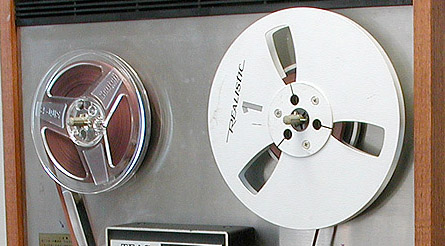 |
|
 |
2009
August
31
|
Two fountain-pen notes
Sad news:
Melody's father, Jim Mauldin, is retiring from the pen-making business
("Pens and More").
The clearance sale is going on right now.
On a brighter note, has anyone had any dealings with
XFountainPens.com?
I know nothing about them, but the prices are right.
And prices that low are not impossible, if they can eliminate middlemen
and don't have to provide much user support. I'm curious.
Permanent link to this entry


|
2009
August
30
|
A wild week or two
The past couple of weeks have been a wild flurry of activity, comprising (among other things)
the beginning of UGA classes;
setting up two research teams and numerous meetings;
Sharon's moving-in at Emory University;
writing and processing a grant proposal on extremely short notice; and
making numerous new business-related contacts (some more fruitful than others).
And, on a sadder note,
getting a somewhat frightening
phone call from a mentally ill person who needed the attention of the police;
getting rear-ended at a rather high speed on a freeway off-ramp;
and finding out about the tragic death of a librarian with whom I had worked, off and on, for many years.
Now you know why I'm behind on my e-mail.
Permanent link to this entry
Covington's Law of Scheduling
Long, long ago I learned that when arranging a meeting time for a group of people,
you should not try too hard to accommodate people who want an unusual meeting time,
or who want the schedule changed repeatedly.
The reason is that those people will end up not coming no matter
what you do to the schedule, and in trying to accommodate them, you've chosen a
time that is worse for everyone else.
Instead, it is better to aim to please about 90% of the people who say they want to come.
Choose a time that is really good for them — they're the only ones who will
actually come, anyhow. Don't try to please everyone.
Recently I had an insight into why this is so.
The people who keep requesting changes are those
for whom this meeting is less important than all the others.
They keep wanting me to move my meeting because they have twenty others that,
to them, are higher priority.
When they realize they're overscheduled, mine is the one they will drop.
Permanent link to this entry


|
2009
August
29
|
How to be a great big fool
Some people want to believe things, not because those things seem to be true,
but because they get an emotional thrill from the opportunity to look down on others,
or the feeling of having been let in on a secret, or pride in having thought up a clever idea.
Such people are what the rest of us commonly call fools.
An instance of foolishness reached me by e-mail this morning. In the middle of a discussion
of software products, one person asserted that certain companies do something which, if true,
would constitute a serious crime on a massive scale.
(To avoid spreading malicious gossip, I won't give any of the details of the accusation, nor who made it.)
What's the evidence for this? I asked. I'm all ears.
The long and short of it is that there was no evidence.
The accuser just imagined that, since the crimes would help the companies make money,
they must be taking place. "You just know..."
Now, if there had been even a shred of evidence, I would have been concerned.
But there wasn't. Just someone's fantasy.
On challenging it, I was given a lot of argumentation about how the lack of evidence doesn't
make it false (well, it doesn't make it true either!).
My big concern was a moral issue: It's wrong to accuse people of crimes without evidence.
The reply I got from the accuser was, "Right and wrong don't stop people from doing things,"
which is so much of a non sequitur that I couldn't tell where he was heading with it.
My other concern, of course, is given an obviously malicious rumor, what's the motive
behind it? Somebody wants us not to buy certain software products. Who, and why?
I know there are undetected crimes going on all the time.
That does not make every imaginary crime real.
By the way, I got all the way through this without
using the words "conspiracy theory."
An accidental omission...
Permanent link to this entry


|
2009
August
28
|
Near zero attention span, and no common sense
Two timely warnings from those who warn us about such things:
(1) "Multitasking" and being "addicted to electronic media"
can be very bad for you.
Who knows how many people are training themselves to have almost no attention span at all
by constantly watching their e-mail, Twitter, Facebook, etc., instead of getting on with life?
I don't even like the telephone — it's an interrupting machine.
Being glued to Twitter or Facebook is, in my opinion, just as foolish as those people
in the 1950s who were glued to the TV and felt they had to see everything that ever
came on the screen.
(2) Plenty of people
don't have the good sense
to keep quiet, in online forums, about things they don't want their employers to hear.
I call it the small-circle-of-friends illusion. People post things on the Internet for the
entire world to see, and then complain when someone outside their inner circle sees them.
Permanent link to this entry


|
2009
August
27
|
Health insurance reform, not health care reform
I don't have a well-organized, defended position on national health care,
but I read with great interest
this
article ("Five Myths about Health Care," by T. R. Reid, in the Washington Post),
which sums up and confirms
some information that had been trickling to me from other sources. Specifically:
-
We should be looking not at Britain and Canada, but at countries like Switzerland, Germany,
and Japan, which provide universal health care through private insurers and providers.
-
Our biggest problems are that health insurance is tied to employment, and people with pre-existing
conditions are not insurable. More generally, our insurance companies are trying to cherry-pick
the people they insure and the conditions they will cover.
-
They reason they do the cherry-picking is that lots of people don't buy insurance unless they
feel they need it.
If everybody had insurance, the whole population would be the risk pool, and the healthy people
would subsidize the unhealthy ones — which is what insurance is for.
-
We need to re-invent health insurance so that everybody can be, and is, covered.
-
By the way, parts of the US system are excessively "socialized" now, and have all the disadvantages of
socialized medicine. I'm referring to the VA and Medicare. Other countries don't need things like this
because they don't have gaps in their private (but government-regulated) systems.
Food for thought.
Permanent link to this entry


|
2009
August
26
|
Excessively frequent software updates
annoy customers and undermine confidence
"You can't use your computer now; Big Brother has to work on it."
"Your computer isn't the way you left it. Big Brother worked on it last night."
By Big Brother, I mean of course Windows Update, Adobe Updater, Java Update, or half
a dozen other things. Why do manufacturers think we want our software updated every
few days? I can think of three reasons:
-
Maybe they think we appreciate the attention. "Bozoware must be really good, they work
on my computer every week!"
-
Maybe updates are the new pop-up ads. "Keep everybody's attention on Bozoware by sending
an update every week whether they need it or not!"
-
Maybe they're just incompetent. "We thought we had it ready to go, but then we found
bugs, and the next week, we found bugs in the bug fixes..."
Only the first of these is positive, and I can assure you it is the wrong impression.
I don't want Big Brother working on my computer every day or every night.
I want software that is well-engineered and doesn't need fixing.
And updates have a dark side. Read on...
Permanent link to this entry
Windows Vista "Configuring updates..."
reboots over and over
Last night (August 24), for the first time in a while, I shut down my office PC;
it needed to install updates. When I turned it back on today, it got to
"Configuring updates: stage 3 of 3 — 0% complete" and rebooted.
Over and over.
This is a notorious
problem
and Microsoft has
several possible fixes.
It's due to an error in a Windows Update.
What worked for me was this:
-
When rebooting, press F8 repeatedly until a menu comes up, and choose "Repair."
-
Use System Restore to get back to a restore point from late July.
-
Reboot twice, create a new restore point (just in case), and use Windows Update to get up to date
(this time it will download the corrected update instead of the erroneous one that came out a few
weeks ago).
I am not impressed. Think how much trouble this has caused in computers that, a day earlier,
were working perfectly!
Permanent link to this entry


|
2009
August
25
|
Optical coherence tomography
 As an astrophotography geek, I pride myself on knowing how optical instruments
work, and in particular, when I go to the eye doctor, I expect to know how all
of the diagnostic instruments work and what they're measuring. But today they
sprung a new one on me.
As an astrophotography geek, I pride myself on knowing how optical instruments
work, and in particular, when I go to the eye doctor, I expect to know how all
of the diagnostic instruments work and what they're measuring. But today they
sprung a new one on me.
I had my retinas checked out with a
Zeiss Stratus
optical coherence tomography machine.
I looked into its lens while it looked into my eye, and I saw a pattern of dots that looked
like the output of a red laser pointer. While I was directed to look at a green dot, the
red dots marched around in a circle, faster and faster.
What it did was pick out a circle on my retina (around the optic nerve) and measure the
thickness of the retina itself, to check for thinning. (I got a clean bill of health.)
What I didn't know until just now is how it did it. The key idea is that laser light
is coherent — the waves are in step with each other — and remains so when
reflected directly, but not when scattered.
That sounds like a tactic for penetrating fog, and it is. If you were taking pictures of objects
in fog, you'd do it by rejecting the incoherent light and looking only at the coherent
light that comes back from them.
Skin, or the human retina, is like fog. You can get recognizable coherent reflections
from as much as a couple of millimeters deep, along with lots of scattered light.
Reject the scattered light, and you can see what's beneath the surface.
Permanent link to this entry


|
2009
August
24
|
We still have stars...
Saturday night, August 22, was unusually clear, and thanks to the economic downturn,
there is a little less glare in the Athens sky than there used to be.
With a Canon 20Da and Astronomik CLS filter, plus a lot of digital image processing,
I was able to get a nice picture of the North America Nebula from my driveway.
This is a stack of four 5-minute exposures.

I also got a reasonably good image of Jupiter, obtained by stacking about 2000 frames of video.

This was taken through my 8-inch telescope in my driveway.
Permanent link to this entry


|
2009
August
23
|
What we mean by photo restoration


This is a sample of a photo restoration Melody recently did for a client.
(It is reproduced with their permission.)
She scanned the original picture, adjusted levels, and deftly retouched it
in Photoshop, removing spots and discoloration
(note especially the blemish on the gentleman's neck, which she removed
by redrawing a small area of the picture by hand).
If you have an old picture you'd like restored, drop us a line.
Don't wait another 100 years, or it may fade out completely.
The original picture, by the way, is not damaged by the process and
sometimes does not even have to be removed from its frame.
Permanent link to this entry


|
2009
August
22
|
My approach to politics
Further to my recent rant about the incivility of much current political discourse...
I am a conservative (I think) but conservatives tend to think I'm a liberal.
I think this is because of my habit of respecting the people on both sides of an issue.
It's also because I mostly want to persuade people who do not already agree with me,
rather than rally those who do; thus I often speak the language and address the concerns
of the other side.
I don't jump on bandwagons.
I won't adopt anything automatically just because it is presented to me as "conservative."
I also understand
very clearly that "conservative" and "liberal" merely describe how you are positioned
relative to others at the time; they do not mean "good" and "evil" and
are not even the names of clearly defined political positions.
I believe in free markets, private property, personal responsibility, limited government, and
representative (rather than direct) democracy.
But I do not think any simple set of policies is guaranteed to be the best solution
to society's problems.
I am not a strict libertarian.
With Aristotle, I believe that the best policy is usually between two extremes.
The opposite of totalitarianism is not freedom but anarchy.
Maximum freedom comes from the right amount of regulation, not the absence of it.
Civil law cannot encode all of morality, but also cannot be separated from it,
simply because the civil law influences people's behavior and people look to it
for moral guidance.
I consider politics a necessary evil; it bores me; and I think a lot of people
overestimate the amount of good
that it can do. I distrust grand solutions; they often get people
into trouble. (Would you rather be governed by Eisenhower, who was rather skeptical of
his ability to do good, or by Hitler or Stalin, who were convinced they had exactly
what everybody needed?)
I am acutely aware that the real question, on any political issue, is generally
what will actually happen if a policy is adopted, as distinct from what its
advocates imagine will happen. This implies that political decisions have to be
based on facts, not just values.
Having been in Europe, I am accustomed to a wider political spectrum than most
Americans, and I am acutely aware that people at all parts of the political spectrum
are intelligent and well-intentioned.
I think it important to know the other side's best arguments, even when I think they
are profoundly mistaken.
The political philosopher who has influenced me the
most is Sir Karl Popper
(which does not mean I agree with him about everything).
He defines a free country as one whose government can be overthrown without bloodshed,
i.e., a place where you can "vote the rascals out."
Key ideas that I get from him are that political changes should be made in small
steps, to avoid grand mistakes; that it is very beneficial to be able to try many
different ideas at the same time (e.g., in separate local governments);
and that one should listen to one's critics and those with whom one disagrees.
Some will be surprised that the philosopher I just cited is not a Christian.
I do not think that Christianity prescribes a political system.
I think some political systems are more compatible with Christian values than others,
but the fact is, there have been, and are, sincere and well-informed Christians almost
everywhere on the political map, from socialism to libertarianism, from kings to
anti-monarchist revolutionaries.
Although I love the American way, I am not going to claim it as God's own (and only)
system.
I do not feel compelled to have a position on every issue.
Nor do I feel compelled to answer political e-mail.
Permanent link to this entry


|
2009
August
21
(Extra)
|
The Georgia faculty furlough scheme
Should the government be required to have a strictly balanced budget?
The State of Georgia is subject to this requirement; it can neither borrow
money nor carry money over from year to year. And that fact is costing me part
of my salary this year.
The University always suffers budget cuts in the years after an economic
downturn, each cut
resulting from the previous year's shortfall in tax collections.
This year, the cuts are particularly severe, and all University employees will be furloughed
(given leave without pay) for a total of six days (equivalent to a 3% pay cut).
The furlough days are days on which employees are on duty but classes do not meet:
one day each in Fall Break and Thanksgiving Break, two in Christmas Break, one in
Spring Break, and finally the reading day between the end of classes and the start of exams.
Individuals can switch to other days if necessary. That's how we'll continue to have
campus police and other necessary services on the furlough days. It's also how the football
coaches will work during Fall Break and the Georgia-Florida Game.
All employees are required to participate unless their salaries are below about $23,000
(I don't have the exact number handy).
I was pleasantly surprised to learn that the Teachers' Retirement System (TRS)
will ignore the furloughs and base all contributions and
pensions on the pre-furlough salary.
That way, the furloughs will not reduce people's pensions.
Those pensions are not paid out of state money, so reducing them would not save
the state a penny. Yet it looked as if the furloughs would reduce many people's
pensions for the rest of their lives. Thankfully this is not so.
I'm going to take seriously the University's statement
that we are forbidden to work on the furlough days.
I will stay away from the campus.
My University e-mail will give an auto-reply explaining the situation.
I'm being strict about this for two reasons: to keep the University honest (don't call it a
furlough if it's not a furlough), and to give the University (and the Legislature)
an incentive to return us to full
pay next year. If we act as if we're content to work for reduced pay, the pay cut will stick.
[Addendum, Aug. 30:] There is another reason not to work on those days.
Reportedly, the University's insurance will not cover us properly if we do.
I am probably going to be attending a conference on behalf of the University
on one of my furlough days, and I'll get my furlough formally changed to a
different date.
Permanent link to this entry


|
2009
August
21
|
Updates
Just a few days after their
offer of a potential 30% interest rate,
we got a letter from the same Sears charge card,
somewhat confusing, but indicating that our regular
interest rate is apparently 17.24%. Hmmm...
I think I've solved that audio dropout problem.
I disabled the antivirus program (Kaspersky) and the
network connection.
Permanent link to this entry
I'm tired of...
[Updated.]
I'm tired of displays of stupidity and obnoxiousness
being passed off as political discourse. President Obama frequently
says intelligent things — I disagree with a good many of them,
but they're intelligent — while many of his opponents act like
amateur 1960s radicals, determined to protest something but vague about what.
From Obama we get proposals for a government health care system.
From some of his critics, such as
Greg Mankiw, we get intelligent rebuttal.
But this is overshadowed by so-called conservatives dishing out
shallowness, shouting matches, misinformation, gossip,
hoaxes, caricatures of Obama as a monkey,
and other things on that level. I'm tired of it.
Are conservatives trying to discredit their own cause?
If conservatism degenerates into gossip and ranting, conservatism
will disappear from the political spectrum.
And if you're a conservative who believes Obama is foolish and dangerous,
ask yourself this: Do you believe it because you've actually looked at Obama
and checked out the facts,
or just because of what other so-called conservatives have been telling you?
A substantial number of Americans voted for Obama.
They are your fellow citizens. Deal with it.
Permanent link to this entry


|
2009
August
20
|
Flurry
It's the first week of classes and the University is really revving up...
If I don't answer your e-mail promptly, please be patient.
Permanent link to this entry


|
2009
August
19
|
I think Sears doesn't want our business
Do you want to pay 30% interest to something that uses the Sears trademark?
We don't. Read on...
Melody got a notice from Citibank, which operates her rarely-used Sears charge card,
starting off as follows:
Currently, the credit card industry is facing unprecedented market conditions.
As a result of this challenging business and economic climate, we are making
changes to your Card Agreement. We value you as a customer...
It goes on to state (with capital letters and boldface as shown):
We are increasing your variable APR for regular Sears and External purchases.
Your regular Sears and regular External purchase ANNUAL PERCENTAGE RATE
will equal the U.S. Prime Rate plus 21.99%. ...
Right now, the prime rate is 3.25%, but in normal times it's about 8%.
That means their interest rate will be 30%.
What's going on? In a few months, credit card companies will find it much harder
to raise interest rates, as new regulations kick in, unless the interest rates
are tied to an economic index such as the prime rate.
So look carefully at your credit cards. They are probably all changing their
rate to "prime rate plus something." If the "something" is reasonable, that's fine.
Prime plus 10% would be in line with the way credit cards used to operate.
But prime plus 21.99%? We'll give this one a miss.
I hasten to add we're not a bad credit risk. We do not normally
carry a balance on
credit cards at all, and we have several cards that
are still under 15%.
I wonder if the people at Sears have considered how Citibank is damaging
their corporate image.
This has certainly led us to distrust them.
We are closing the account.
As I said, I think this one doesn't want our business.
Permanent link to this entry


|
2009
August
18
|
What will Mars do on August 27?
What will Mars do on August 27?
Nothing,
of course.
The hoax just won't stop!
Permanent link to this entry
Tragedy
The University of Georgia is mourning a well-liked librarian, Sherry L. Allen Schweder,
and her husband, both of whom were apparently killed by a pack of wild dogs near their
rural home in Oglethorpe County. We are in shock, and wondering whether we've heard the
whole story.
Permanent link to this entry


|
2009
August
17
|
Miscellany
GoldWave doesn't have those awful drop-outs, so I'll be using it from here on.
I don't know why Audition 1.5 can't record reliably on my computer. There are lots
of things I might try — but it takes about an hour of recording to tell whether
or not the problem is still there, so it's not feasible for me to simply try them one
right after another.
I've bought a number of old prerecorded 4-track stereo tapes, one of which is Eugene
Ormandy's Festival of Marches (popular on vinyl in the 1960s but never released on CD;
it contains the definitive performance of The Stars & Stripes Forever as well as many
nice pieces of music from operas). In making my own CD, I listened to it carefully and heard
noises that sound like vinyl-record artifacts — occasional pops from a speck of
dust or a tiny flaw in the plastic. There are also places where it sounds as if the stylus
is tracking a loud passage imperfectly. This led me to ask whether some of these early 4-track
tapes were manufactured by recording from an LP record, rather than from the master tapes.
This article says yes, at least for a publisher less
distinguished than Columbia and an orchestra less distinguished than Ormandy's.
Meanwhile, the shortage of tropical storms is over — we apparently have three.
Permanent link to this entry


|
2009
August
16
|
How to splice a tape recording when you
don't have a splicing block
Here's a handy hint for any audio atavists other than me who still need
to splice tape, but don't have a splicing block to hold it in place for
the operation.
Stick a piece of Scotch double-stick tape to your desk. Touch the upper
side with your fingers repeatedly to take away some of the stickiness.
Now lay down the ends of the tape to be spliced, right on the sticky area.
Line them up, apply splicing tape, rub it down, and turn the whole thing over
and do the other side.
I think this is better than using a splicing block. I did it this
way today and made an inaudible repair to a tape that broke while I was
playing it.
Incidentally, for anything but the most temporary repair, you have to have
real splicing tape (even if you don't have a splicing block).
Other kinds of tape will come loose or exude sticky material at the ends.
Permanent link to this entry
Miscellany
This year we had no named tropical storms in the Atlantic
until August 15, and (as this is
written) we still have had no hurricanes, even though the season opened 10
weeks ago. I blame it on budget cuts :)
Nothing is too trivial for the Internet: Here
is a web page of clips from major movies in which you can see a tape recorder in use,
classified by make and model of tape recorder. Check out the Wollensak T-1500
in Quiz Show (1994).
Permanent link to this entry


|
2009
August
15
|
Recession improves astronomy
An unexpected benefit of the recession is that there is considerably less
glare from city lights at my house than there used to be.
Tonight (Aug. 14) I can clearly see the main parts of the summer
Milky Way, even though the sky isn't especially transparent.
Two or three years ago, the Milky Way was, at best, barely visible.
Permanent link to this entry


|
2009
August
14
|
Mysterious drop-outs with Adobe Audition 1.5
To digitize audio, I use a 2.4-GHz single-core computer running Windows XP.
Recording with Adobe Audition 1.5, I've been troubled by drop-outs (lasting
about 0.1 second, clearly audible) when recording longer passages. On one
of them they occurred at 5-minute intervals; on others, they crop up after ten
or fifteen minutes.
|
[Update, Aug. 21:] Here's what fixed it: The dropouts ceased when I disabled the antivirus program
(Kaspersky) and the network connection while recording. The other speculations
described below didn't fix the problem, although they may have reduced it.
|
I don't know the cause, but I'm switching to
GoldWave for recording.
Unlike Audition, GoldWave asks you how much memory to allocate before you make
a recording. GoldWave also explains, in its clear documentation, that a problem
such as I describe could arise if you recorded to RAM rather than to temporary files,
because eventually Windows is going to swap RAM to disk. By default, GoldWave
records to temporary files. I don't know if Audition has the option to do that.
Possible solution (which in fact
did not fix it, but is worth knowing about for other reasons):
One of the discussants on this page
says dropouts result if the sound card and Audition are not
set to the same bit rate. (I thank Pete Albrecht for the link.)
I normally record at 44.1 kHz (CD standard) but the newly
installed sound card was running at 48 kHz. To make the setting, go to Programs,
Creative, Device Control:

This setting cannot be made from Control Panel, at least with this particular sound card.
I haven't tested whether it cures the problem, but matching the input and recording
sample rates is surely a good idea.
Further update:
If I set the Sound Blaster to 44.1 kHz, I can't monitor the output! The signal coming
into Line In isn't fed to the speakers. So I have had to leave the Sound Blaster at 48 kHz
and set Audition to record at 48 kHz (48,000 samples/second). And this did not get
rid of the dropouts. Time to register a new copy of GoldWave and do all my recording
with that. Audition is for editing,
not for recording.
Yet further update:
More things that did not cure the dropouts:
Enlarging all the buffers and caches used by Audition;
telling Audition not to swap onto drive D, which is a Seagate that
seems to have its own sleep mode.
A remaining possibility is that the antivirus (Kaspersky)
or something on the network is causing the disruptions.
The thing is, Audition ought to at least detect the problem.
Permanent link to this entry


|
2009
August
13
|
Short notes and updates
We did our first tape-to-CD conversion today (for a client; we've done lots of them
for ourselves). It was a bit of a challenge: half-track monaural, recorded at 1 7/8 ips
(slower than the usual standard speeds), and the tape was deteriorating and
sticky. It was an uncommon reel size (4 inches). But we got sound, and we made a CD.
Melody has also done an impressive photo restoration that I hope to be able to show you soon.
One of the best amateur pictures of Jupiter that I've ever seen was taken with a 14-inch telescope
by Brian Combs. Have a look!
Permanent link to this entry
Some good words about a bank
All readers know that I'm a harsh critic of (large parts of) the banking industry.
Today I want to take time out from that, to say some
good things about SunTrust,
of which I've been a customer, one way or the other, most of the time since opening
my very first bank account in 1973.
In favor of SunTrust:
-
They provide consistent personal service. Although the personnel do get moved
around, they tend to stay in place for a few years, not weeks, at a time,
and then they introduce me to their successors.
-
They are very helpful when something goes wrong. Right now, we're sorting out
a situation where an electronic funds transfer was made for the wrong amount
(AFAIK it wasn't the bank's error). Apparently it's not going to cost me a penny.
-
They don't overcharge. I've been bewailing the way other people are getting hit with
overdraft fees of $40 several times a day. SunTrust's overdraft fee, as far as I can tell,
is $10 once a day.
They were the first bank (other than a handful of credit unions) to align themselves
with America's new culture of thrift.
"Solid," they call it.
In fact, they launched this ad campaign back in November 2008.
Is there anything not to like? Only that their online banking is not quite as spiffy
as Bank of America's. Transactions show up at the end of the day (midnight) rather than
immediately. (But this may be what keeps the overdraft fees down.)
Also, back in March, SunTrust
was rated financially weak (as many banks have been this year).
For what it's worth, SunTrust's stock price has roughly doubled since then.
Permanent link to this entry


|
2009
August
12
|
Out-Firefoxed
I'm gradually switching from Firefox 3.0 to Internet Explorer 8. The main reasons are:
- Firefox 3.0 often fails to refresh obsolete web pages unless I click Refresh.
I'm tired of looking at obsolete weather radar images, and in one case I missed
the news of someone's wedding because I was looking at a cached copy of his Facebook page.
- IE 8 lets you open a new tab by clicking on a little narrow tab at the right of
the existing ones; Firefox 3.0 wants you to hit Ctrl-T (which may not work, depending on what
kind of page you're viewing at the time) or make a menu choice.
- I can edit my Favorites for IE 8 as a Windows folder, not just using the operations
provided by IE 8.
I know Firefox 3.5 is out there, and I suppose I should try it.
Permanent link to this entry
Econo-notes
One of the truisms of national health policy has been that preventive care saves money.
Now the Congressional Budget Office says it doesn't.
Hmmm... Note that the CBO is not Obama's mouthpiece here; in fact they have been
fairly critical of his economic policies. Their job is to be fact-finders.
Banks continue to be
making a fortune in overdraft fees.
I've said before that I consider this
unethical, a form of predatory lending.
Congress and the Federal Reserve are beginning to see it the same way.
Permanent link to this entry


|
2009
August
11
|
All I know is what I read in the papers
(or see in the sky)
[Minor update.]
About a year ago, I had a problem with
searchlights
promoting a local gym, the Omni Club,
and blocking my view of the night sky.
The manager replied to my inquiry by asserting
his right to advertise by shining lights over people's houses.
Nonetheless, the lights went away, and I heard indirectly that the county commission
may have restricted them in some way.
Now the same manager is facing a
strange lawsuit
accusing him of interfering with a competitor, BodyPlex, "going to area businesses to destroy BodyPlex
promotional materials, and papering their own fliers on cars parked outside the competing
fitness club, BodyPlex," and spreading rumors that BodyPlex was about to go out of business.
I have no way to know if any of this is true. But if it is, searchlights probably
won't fix the problem.
Permanent link to this entry


|
2009
August
10
|
Cyber tape deck?
Contemplating a project...
Sadly, the
vintage Pioneer tape deck
that I've had since about 1979, and recently overhauled, still isn't usable.
The motor gets tired. After it's been running for ten minutes or so,
the speed starts to drop. This must be a problem with its servo speed control
(inside the motor housing). There's apparently nothing wrong with the power supply
upstream from the motor, and there doesn't seem to be a mechanical problem — in fact,
the trouble can be reproduced with no tape actually in the deck, and I can't
see how a mechanical problem would wait ten minutes to manifest itself.
I'm looking for a new motor for it, but another possibility is to
re-engineer the motor control system myself. The motor always turns at
the same speed and in the same direction. So does the main flywheel,
which turns the capstan.
How hard could it be to build a circuit that senses the flywheel speed
and adjusts the motor voltage to hold the speed constant?
And will I ever have time?
Of course, our good cassette deck
has six motors, not one... I'm doing some cleaning and adjustment on it now.
Permanent link to this entry


|
2009
August
9
|
"Nonrefundable deposit"
Cathy points out that many apartment complexes require a "nonrefundable deposit" if you have a pet...
...but if it's not refundable, it's not really a deposit, is it?
Permanent link to this entry


|
2009
August
8
|
Photo retouching, restoration, and magic
Unfortunately I can't show you any examples right now, but Melody is having great fun
scanning and restoring old photos, a service she offers as part of her
graphics business.
It's more than just adjusting the colors and the levels. Melody is an artist and
can actually draw. So if part of a person's face is obscured by a stain, she
can draw it back in.
Permanent link to this entry


|
2009
August
7
|
Another lunar image

Here's another picture from the other night's photo session.
Not great, for a 5-inch telescope, but it is of some interest.
Here you see Sinus Iridum (a C-shaped bay in the lower part of the picture,
just left of center) and
dark-floored crater Plato (at the upper right).
To the right of Plato is the Alpine Valley, an unusual, straight
canyon that was apparently formed by a huge meteor whizzing across the
surface of the Moon.
Permanent link to this entry
Beware of fake security warnings and error messages
Don't believe everything that appears on your computer screen.
See this ZDnet news story.
This is one more reason not to like frequent software updates
— some of the updates may be fake.
Software should be built right the first time; I do not admire companies like
Adobe for "having to" update their software every few days. What would you think of
the construction of a car that got recalled to the shop every few weeks for
modifications?
Permanent link to this entry


|
2009
August
6
|
Horoscopes and Fourier series
Here's an interesting idea that came up in conversation
with my old friend Sharon Persinger last night:
Maybe the reason people believe in astrology is that horoscopes sometimes
match periodicities of human activities that are of interest.
What I mean is this. Lots of human activities (the stock market, sports rankings, a person's mood, etc.)
have some tendency to rise and fall in cycles, at least imperfectly and temporarily.
The cycles result largely from delays between cause and effect. Just like a pendulum, almost any
complex system can swing back and forth as events happen which tend to reverse earlier events after a delay.
Well, the sky is full of periodicities too. You can find something that orbits, or catches up with some
other orbit, or crosses lines in a geometrical pattern, etc.,
at practically any interval you wish. You won't get a perfect match, but you can often
match up something in the sky with something on earth well enough to go several cycles before losing sync.
So if you find a 30-year cycle in some human activity, you can claim that it's due to the 29-year cycle
of Saturn, to take just one example. The match isn't perfect, but it's good enough for several full cycles;
then you can make a minor adjustment.
This doesn't mean that the stars and planets influence us — only that you can use the sky as a clock and
calendar, to match up with cycles that exist for other reasons.
The principle is the same as Fourier analysis, which reconstructs any complicated waveform as
a combination of simpler waves.
Permanent link to this entry


|
2009
August
5
|
Something lunar...

From the same observing session as my Jupiter picture, using the same 5-inch telescope
and the same technique, here's a view of the southern part of the Moon, with the
crater Tycho at the top right. The Moon was low in the sky, and this is not a top-quality image.
Permanent link to this entry


|
2009
August
3-4
|
Jupiter and 45 Capricorni

From right to left: Jupiter, its satellite Europa, the star 45 Capricorni,
and Jupiter's satellite Ganymede.
A few hours before I took this picture, Jupiter actually passed in front of
45 Capricorni, but Jupiter was not in the North American sky at the time.
Astronomers in Europe were busy measuring the exact timing of the event
(as a way of checking Jupiter's position precisely) and also taking spectrograms
of starlight passing through the atmosphere of Jupiter.
I used my vintage 1980 Celestron 5 telescope with a ToUCam Pro video camera
and my usual technique of recording many frames of video and stacking them
with RegiStax.
Permanent link to this entry


|
2009
August
2
|
Getting sound from a ribbon of rusty plastic

It's working... we have the tape system completely assembled, and
we're successfully turning people's reel-to-reel tapes (and cassettes,
and vinyl records) into digitally-edited audio CDs. Now, as we move toward
offering this as a commercial service, the question is how to price it.
It's fairly time-intensive (you can't play an hour of tape in less than an hour).
("A ribbon of rusty plastic?"
Yes, the brown magnetic material on recording tape is iron oxide,
or rust.)
We had a good visit last night from an old friend and erstwhile radio star,
and we preserved for posterity, among other things, a 1981 newscast about the dawn of
Cabbage Patch Kids.
Incidentally, does anybody need a pair of speakers?
The bargain Insignia speakers
that I was enjoying so much have had to go because they can't be hung on the wall.
They've been replaced with these, which have a bit less bass
but are nice and clear-sounding.
NOTE TO THE CURIOUS: I've made minor changes to the
operating
principles of this Daily Notebook; you may want to have a look.
Permanent link to this entry
An economic consequence...
One last thing about these state-employee furloughs (which are much more serious in California
and other states than here).
When people choose an employer, they consider not only salary, but also other characteristics
of the job, such as stability.
People often take government jobs at lower salaries than they could command in industry, because the
government is more stable — it won't go out of business or undergo sudden downsizing.
Well, now that governments are undergoing sudden downsizing, they're going to lose that advantage.
In the future, governments will have to pay higher salaries to hire the same kind of workers.
Permanent link to this entry


|
2009
August
1
|
Dubious idea: "Sales tax holiday"
The State of Georgia is:
(1) Furloughing teachers because of a shortfall in tax income;
(2) Having a "sales tax holiday" supposedly to help parents
with back-to-school shopping, but mostly to help merchants.
I know that if you lower taxes, revenue can go up because there's more
activity to tax. But surely that works only if you don't lower them all the way to zero!
Permanent link to this entry


|
|
|
This is a private web page,
not hosted or sponsored by the University of Georgia.
Copyright 2009 Michael A. Covington.
Caching by search engines is permitted.
To go to the latest entry every day, bookmark
http://www.covingtoninnovations.com/michael/blog/Default.asp
and if you get the previous month, tell your browser to refresh.
Entries are most often uploaded around 0000 UT on the date given, which is the previous
evening in the United States. When I'm busy, entries are generally shorter and are
uploaded as much as a whole day in advance.
Minor corrections are often uploaded the following day. If you see a minor error,
please look again a day later to see if it has been corrected.
|
|













